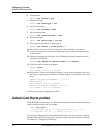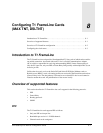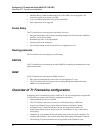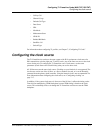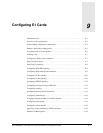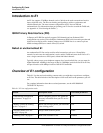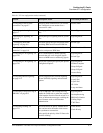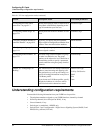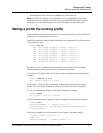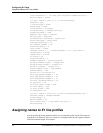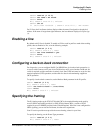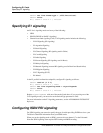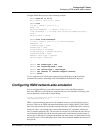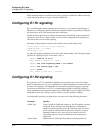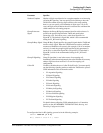
9-4 Preliminary May 9, 2000 APX 8000/MAX TNT/DSLTNT Physical Interface Configuration Guide
Configuring E1 Cards
Understanding configuration requirements
Understanding configuration requirements
You need the following information from your E1/PRI service provider:
• The telephone numbers assigned to your E1/PRI interface, channel-by-channel
• Nailed-up channels (also called private WAN), if any
• Unused channels, if any
• Switch type (or emulation)—DPNSS only
• Switch layers 2 and 3 configuration—Digital Access Signaling System (DASS) 2 and
DPNSS only (A/B end, X/Y end)
“Configuring the front-end E1
transceiver” on page 9-13
Set the front end type of the E1 transceiver to
Long-Haul or Short-Haul, depending on the
type of termination your line uses.
Front-End-Type
“Configuring channel usage” on
page 9-14
Specify how each of the E1 channels is to be
used.
Channel-Usage
“Assigning telephone numbers to
switched channels” on page 9-14
Typically, you specify only the rightmost
digits needed to distinguish one number from
another. These are called add-on numbers.
Phone-Number
“Configuring trunk groups” on
page 9-14
A trunk group is a group of channels that has
been assigned a number.
Trunk-Group
“Configuring nailed channels” on
page 9-15
You must assign a nailed channel to a group
to make it available for use. The group
number can be referred to in a Connection or
Frame-Relay profile to specify a permanent
leased connection using that group of nailed
channels.
Nailed-Group
Chapter 19, “Configuring Call
Routing”
The TAOS unit uses call routing to determine
where to route incoming and outgoing calls.
The preferred way to set up call-routing is to
put all call routing information in one place: a
Call-Route profile.
If you do not use Call-Route profiles, specify
the physical address of a device to which
calls received on this channel are routed.
Default-Call-Type
Call-by-Call-Service
Shelf
Slot
Item
Table 9-1. E1 line configuration tasks (continued)
Section Description of task Associated parameters



